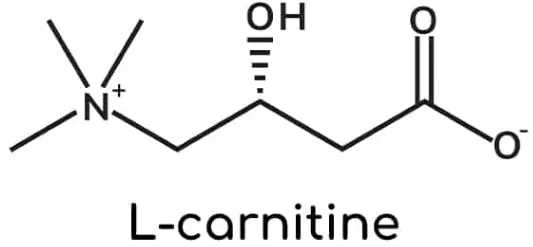Can L-carnitine Powder Boost Energy Levels?
L-carnitine powder has gained significant attention in the health and fitness community as a potential energy booster. This amino acid derivative plays a crucial role in energy metabolism by transporting fatty acids into mitochondria, where they can be oxidized to produce energy. As fatigue and low energy levels affect many individuals in today's fast-paced world, supplements like L-carnitine powder are increasingly being explored as natural solutions to enhance vitality and performance.

What Does L-carnitine Powder Do for Energy Production?
The Biochemical Role of L-carnitine in Metabolism
L-carnitine powder functions as a critical component in the body's energy production system. It serves as a transporter molecule that shuttles long-chain fatty acids across the mitochondrial membrane into the mitochondria, often called the cell's powerhouse. Once inside, these fatty acids undergo beta-oxidation, converting fat into usable energy in the form of ATP. Without sufficient L-carnitine, this process becomes inefficient, potentially leading to reduced energy production and increased fatigue. Supplementation with L-carnitine powder may help optimize this metabolic pathway, especially during periods of increased energy demand such as exercise or stress.
Clinical Evidence Supporting L-carnitine's Energy Effects
Several studies have investigated the relationship between L-carnitine powder supplementation and energy levels. Research published in sports medicine journals shows that participants taking L-carnitine supplements experienced improvements in exercise performance and reduced muscle fatigue compared to placebo groups. Another study involving middle-aged adults with chronic fatigue demonstrated that daily L-carnitine powder supplementation over 12 weeks resulted in increases in energy levels and improved cognitive function. The evidence is particularly strong for individuals with conditions affecting energy metabolism, such as cardiovascular disease, where L-carnitine has been shown to improve exercise tolerance and reduce fatigue symptoms.
Who Can Benefit Most from L-carnitine Powder Supplementation?
L-carnitine powder supplementation offers varied benefits depending on individual circumstances. Athletes and fitness enthusiasts often report advantages from L-carnitine powder, as their energy demands are consistently high. Vegetarians and vegans represent another group that may benefit from supplementation, as L-carnitine is primarily found in animal products, potentially leading to lower natural levels in plant-based diets. Older adults often experience age-related declines in mitochondrial function and natural L-carnitine production, making supplementation potentially beneficial for maintaining energy levels. Individuals with certain medical conditions affecting metabolism, such as type 2 diabetes or hypothyroidism, have also shown positive responses to L-carnitine powder in clinical settings.

How Does L-carnitine Powder Compare to Other Energy Supplements?
L-carnitine Powder vs. Caffeine and Stimulant-Based Products
L-carnitine powder offers a fundamentally different approach to energy enhancement compared to caffeine and other stimulant-based supplements. While caffeine works primarily through the central nervous system by blocking adenosine receptors to create a temporary feeling of alertness, L-carnitine powder addresses energy production at a cellular metabolic level. This distinction is important because caffeine typically provides a quick but short-lived energy boost often followed by a "crash," whereas L-carnitine powder supports sustained energy production without stimulating the nervous system. Users frequently report more consistent energy levels without the jitteriness, increased heart rate, or sleep disturbances commonly associated with caffeine consumption. Additionally, unlike stimulants that can create dependency issues, L-carnitine powder supports the body's natural energy production pathways without typically leading to adaptation or diminishing returns.
Combining L-carnitine Powder with Other Nutrients for Synergistic Effects
L-carnitine powder's energy-boosting effects can be enhanced when combined with complementary nutrients. Coenzyme Q10 (CoQ10) makes an effective partner for L-carnitine powder, as both compounds support mitochondrial function through different mechanisms—L-carnitine facilitates fatty acid transport into mitochondria, while CoQ10 supports the electron transport chain within mitochondria. B vitamins, particularly B6, B5, and B12, also work synergistically with L-carnitine powder by supporting various aspects of energy metabolism. Alpha-lipoic acid represents another valuable companion to L-carnitine powder, as it helps recycle antioxidants within cells and protects mitochondria from oxidative damage. Many specialized energy formulations now combine L-carnitine powder with these complementary nutrients to create comprehensive support for cellular energy production.
Long-term vs. Short-term Energy Benefits of L-carnitine Powder
The energy benefits of L-carnitine powder manifest differently across varying timeframes of supplementation. In the short term (days to weeks), users report modest improvements in exercise performance, reduced recovery time, and slightly elevated energy levels, though these effects are typically subtle compared to stimulants. The more significant advantages often become apparent with consistent, long-term supplementation over months, as the compound gradually optimizes mitochondrial function and fatty acid metabolism. Studies tracking participants for 8-12 weeks show more substantial improvements in energy parameters compared to shorter studies. This suggests that L-carnitine powder works more as a metabolic optimizer than an immediate energy booster. Long-term supplementation appears to provide adaptive benefits—the body becomes more efficient at utilizing fatty acids for energy, potentially leading to improved metabolic flexibility and enhanced energy sustainability.
When Is the Best Time to Take L-carnitine Powder for Energy?
L-carnitine Powder Timing Around Workouts and Exercise
The timing of L-carnitine powder consumption can influence its effectiveness for energy enhancement during physical activity. Many experts recommend taking L-carnitine powder approximately 30-60 minutes before exercise to ensure optimal availability during the workout. This pre-exercise timing allows the L-carnitine to be present in the bloodstream when the demand for fatty acid oxidation increases at the onset of physical activity. Research suggests that taking L-carnitine powder before exercise may enhance fat utilization during moderate-intensity activities, potentially sparing glycogen stores and delaying fatigue. Some athletes also report benefits from taking a smaller dose immediately after exercise to support recovery processes. The effectiveness seems particularly pronounced when combined with small amounts of carbohydrates before exercise, as insulin helps facilitate L-carnitine uptake into muscle tissue.
Daily Dosing Strategies for Sustained Energy Support
For those seeking sustained daily energy enhancement rather than workout-specific benefits, different approaches to L-carnitine powder dosing may be more appropriate. Many experts recommend dividing the daily intake into two or three smaller doses spread throughout the day rather than taking a single large dose. This approach helps maintain more consistent L-carnitine levels in the bloodstream, potentially supporting more stable energy production throughout daily activities. Morning supplementation is often advocated as a foundation for daily energy, particularly for individuals who experience mid-morning fatigue. Some users report enhanced benefits when taking L-carnitine powder with meals containing fat and carbohydrates, as these macronutrients can facilitate better absorption. The typical effective dosage range for energy support falls between 1000-3000mg daily, though individual responses vary based on body weight, activity level, and natural L-carnitine status.
L-carnitine Powder and Meal Timing Considerations
The relationship between L-carnitine powder supplementation and meal timing presents another important consideration for maximizing energy benefits. Research indicates that L-carnitine powder absorption may be enhanced when consumed with carbohydrate-containing meals due to the insulin response that facilitates L-carnitine transport into tissues. Morning supplementation alongside breakfast appears particularly beneficial for many individuals, as it coincides with the body's natural cortisol rhythm and prepares the metabolic system for the day's energy demands. For those practicing intermittent fasting, taking L-carnitine powder during eating windows rather than fasting periods may improve its utilization, though some research suggests potential benefits even during fasted states, particularly for fat metabolism. The composition of accompanying meals also matters—moderate amounts of healthy fats alongside L-carnitine powder may support its role in fatty acid metabolism.
Conclusion
L-carnitine powder offers promising benefits for energy enhancement through its fundamental role in fatty acid metabolism. The evidence suggests it may particularly benefit athletes, vegetarians, older adults, and those with specific metabolic conditions. Unlike stimulants, L-carnitine powder supports sustainable energy production at the cellular level, especially when combined with complementary nutrients and used consistently over time. Proper timing and dosing strategies can further optimize its effectiveness for both exercise performance and daily vitality.
Shaanxi Yuantai Biological Technology Co., Ltd. (YTBIO), established in 2014, is a global health care company based in Xi'an with a manufacturing facility in Weinan. We specialize in health food ingredients (such as Herbal Extracts, Magnesium Threonate, and Creatine Monhydrate) and cosmetic ingredients (including Sponge Spicule, Retinol, Glutathione, and Arbutin). We work with partners in Europe, America, Southeast Asia, and Korea. With a warehouse in Rotterdam for EU distribution and plans for U.S. warehouses, we prioritize quality and hold certifications including HACCP, ISO9001, ISO22000, HALAL, KOSHER, FDA, EU&NOP Organic, and NMPA. We also assist Korean clients with KFDA registration. Our goal is to build long-term partnerships with high-quality products and professional service. For inquiries, contact us at sales@sxytorganic.com or +86-029-86478251 / +86-029-86119593.
References
1. Fielding R, Riede L, Lugo JP, Bellamine A. L-carnitine supplementation in recovery after exercise. Nutrients. 2018;10(3):349.
2. Wall BT, Stephens FB, Constantin-Teodosiu D, Marimuthu K, Macdonald IA, Greenhaff PL. Chronic oral ingestion of L-carnitine and carbohydrate increases muscle carnitine content and alters muscle fuel metabolism during exercise in humans. The Journal of Physiology. 2011;589(4):963-973.
3. Malaguarnera M, Cammalleri L, Gargante MP, Vacante M, Colonna V, Motta M. L-Carnitine treatment reduces severity of physical and mental fatigue and increases cognitive functions in centenarians: a randomized and controlled clinical trial. The American Journal of Clinical Nutrition. 2007;86(6):1738-1744.
4. Koozehchian MS, Daneshfar A, Fallah E, et al. Effects of nine weeks L-carnitine supplementation on exercise performance, anaerobic power, and exercise-induced oxidative stress in resistance-trained males. Journal of Exercise Nutrition & Biochemistry. 2018;22(4):7-19.
5. Brass EP. Supplemental carnitine and exercise. The American Journal of Clinical Nutrition. 2000;72(2):618S-623S.
6. Sahlin K. Boosting fat burning with carnitine: an old friend comes back in from the cold. The Journal of Physiology. 2011;589(7):1509-1510.
_1737093401309.png)
